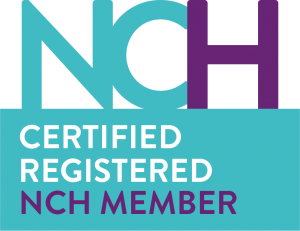About Hypnotherapy & The Unconscious Mind
|
It is said that all change happens at the unconscious level, because it is our unconscious mind that is responsible for storing our memories and experiences, which then influence and control our thoughts and behaviours. We operate from our unconscious which stores 95% of our programmes.
It is important when working with hypnotherapy for therapeutic purposes that your hypnotherapist is fully qualified to do so and is a member of at least one of the professional bodies that regulate the hypnotherapy profession, such as the National Council for Hypnotherapy. |
What is hypnotherapy?
Hypnotherapy is a brief strategic therapy aimed specifically at finding a resolution to your problems as quickly, safely and efficiently as possible. During a session you are guided into hypnosis for therapeutic purposes. Hypnotherapy can change your patterns of behaviour and perceptions, enabling irrational fears, phobias, habits, negative thoughts and suppressed emotions to be overcome. You are able to look at problems differently, accessing your inner resources to find solution for the problem. Hypnotherapy enables you to let go of old unconscious patterns, relieving you of the emotional baggage that has been weighing you down. You can make new choices and be the person you want to be.

What types of hypnotherapy are there?
There are several different schools of hypnotherapy including Solution-Focused Hypnotherapy, Clinical Hypnotherapy, Ericksonian Hypnotherapy, Regression Hypnotherapy and Cognitive Hypnotherapy. I work as a Quest Cognitive Hypnotherapist, as I am able to utilise the tools from many different brands of hypnotherapy and psychotherapy. This is because I believe that the treatment I offer should be bespoke to you, so that it always fits to your way of thinking and being. In that way you do not have to rigidly fit to a particular brand; I am able to adapt to your way of working and help you to a solution that is right for you.
What is hypnosis?
Hypnosis is a technique which utilises a naturally occurring state of mind which is used widely throughout the world by many doctors, dentists, psychologists and psychotherapists. It is essentially a connection between the conscious and unconscious mind, and therefore a way to communicate with the problem-solving part of the human mind. During hypnosis, you are able to access a state of physical and mental relaxation, a ‘trance state’ during which we become inwardly focused. You are still aware of what is going on around you, but with a comfortable sense of detachment from it.
Hypnosis works with your state of consciousness, in such a way that the analytical, 'critical faculty' part of the brain is quietened down, while the non-analytical creative side is made more alert. This allows the subconscious mind to come to the fore, where it is able to accept suggestions more easily. The subconscious mind contains all your memories and experiences, and controls your thoughts and behaviours, and this is the part which we are than able to update, enabling you to alter your behaviour and physical state.
Hypnosis works with your state of consciousness, in such a way that the analytical, 'critical faculty' part of the brain is quietened down, while the non-analytical creative side is made more alert. This allows the subconscious mind to come to the fore, where it is able to accept suggestions more easily. The subconscious mind contains all your memories and experiences, and controls your thoughts and behaviours, and this is the part which we are than able to update, enabling you to alter your behaviour and physical state.
What happens in a hypnotherapy session?
|
Hypnosis quiets the analytical mind and allow us to safely access the unconscious through the REM (or dreaming) state. The hypnotherapist will guide you into a state of relaxation, often with guided imagery, which feels like that comfortable state between sleeping and waking, where you are consciously aware of your surroundings and in control whilst your body is feeling very relaxed.
Whilst deeply relaxed, you are able to access the observing state to find new ways of thinking, through the resources you hold in your unconscious; opening lines of communication between your conscious and unconscious mind to help you to resolve problems, habits and negative emotions. Your unconscious is able to accept positive suggestions that enable you to make the changes you want in your behaviour. |
What does hypnosis feel like?
'Trance' is a naturally occurring state which we all experience each day of our lives and hypnosis utilises this state to communicate with the unconscious. If you have ever driven a car and arrived at your destination without quite remembering all of the journey or you have been watching the TV and then realised that at some point you drifted off and have missed half the plot, this is because you have taken yourself into a ‘trance state’, to your internal world of thoughts and feelings. In this respect, all hypnosis is self-hypnosis. The therapist cannot make you say or do anything that is conflict with your morals or values and you remain in control of the process at all times.
Is hypnosis safe?
The British Medical Association and American Medical Association have both endorsed the use of hypnotherapy since the 1950’s.
How can hypnotherapy help me?
A hypnotherapist uses hypnosis to gain access to the subconscious mind to suggest positive and beneficial ideas which then become firmly planted in your subconscious. It is also possible to recall and resolve past memories which relate to your current difficulties. Old, outdated and inappropriate patterns of behaviour can be let go, in favour of new, more rewarding and comfortable ways of being.
Hypnotherapy is used in the resolution of negative habits such as smoking cessation and nail biting but this is only a small part of the change work that is achievable with this technique. A hypnotherapist is also skilled at helping with life conditions such as stress, anxiety, depression and panic attacks, as well as physical conditions including migraine headaches, IBS and pain management.
NLP Coaching tools can also be integrated with and used in conjunction with hypnosis so that you can access positive solutions for yourself, developing new ways of thinking and approaching the challenges in life.
Hypnotherapy is used in the resolution of negative habits such as smoking cessation and nail biting but this is only a small part of the change work that is achievable with this technique. A hypnotherapist is also skilled at helping with life conditions such as stress, anxiety, depression and panic attacks, as well as physical conditions including migraine headaches, IBS and pain management.
NLP Coaching tools can also be integrated with and used in conjunction with hypnosis so that you can access positive solutions for yourself, developing new ways of thinking and approaching the challenges in life.
|
To book a coaching programme that will have you Back In Tune with your true self, call or email me now. The first step is to book your free 20 minute discovery call to discuss the outcome you are looking for, explore how this coaching can work for you and ask any questions you may have.
Please visit the other web pages for further information on coaching and therapy or contact me using the button below. |
Locations
Online - via Zoom, wherever you are in the UK or overseas. I work with my clients wherever they are in the world, so that you can access the resources you need at your own convenience. Face to Face Sessions are held on specific days at: Zen Rebel Studios, Midsomer Norton, BA3 2DT Elm Hayes Surgery, Paulton, BS39 7SF The Lansdown Clinic, Lansdown Road, Bath, BA1 5EE Office Hours Monday 9.00am - 2.00pm Tuesday 9.00am - 3.30pm Wednesday 9.30am - 4.00pm Friday 10.00am - 6.00pm Email, text or call (please leave a voicemail) |







